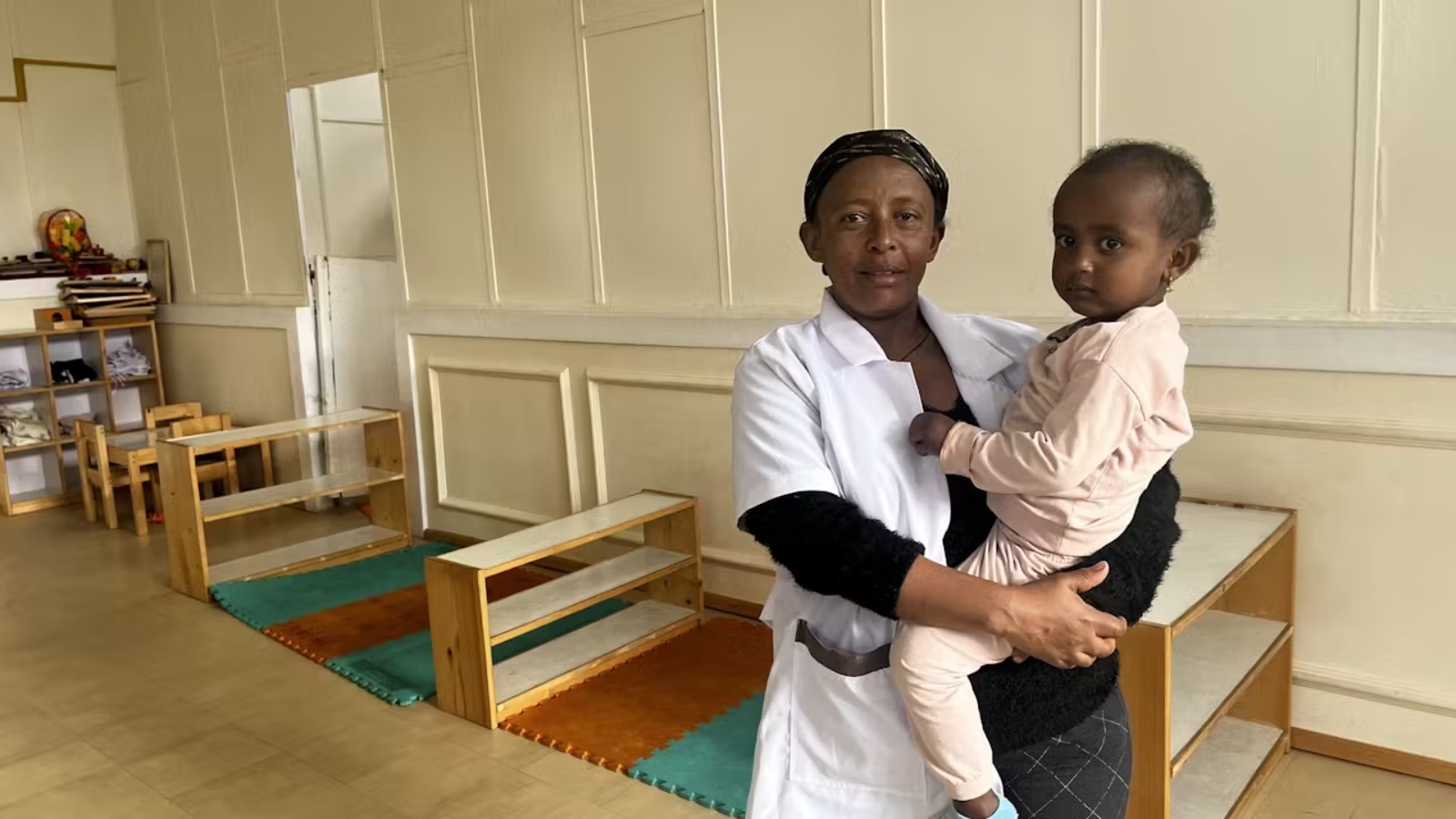
Meseret Tamru is a garment factory worker living in Addis Ababa, Ethiopia. She is the mother of two children. Thanks to the childcare centre at her workplace, she has been able to return to work after becoming a parent. The International Labour Organization (ILO) project “Promoting Workers’ Rights and Gender Equality in Africa,” funded by the Norwegian Ministry of Foreign Affairs, helped to build the childcare centre.
Below is a section of Meseret Tamru's story. Read her full story by clicking here.
Meseret Tamru's Story
In 2019, I gave birth to my first child at the age of 24. After that, I had to stop working to take care of my family as childcare was unaffordable for us. My second daughter, Kalkidan, was born in 2021. Her name means "Promise".
When I didn't work, it was very difficult to cover all our expenses with only my husband’s income. We had to pay rent, buy groceries, diapers, and clothing. Every month, we struggled to cover these costs. Our situation caused me a lot of stress. I was constantly hoping for an opportunity to return to work and help support the family.
Then, we saw an announcement for a vacancy posted in our neighbourhood. It was for a job at a garment factory with a newly opened childcare centre. I was thrilled at the idea of returning to work. I could have an income and a place to take care of my youngest child nearby. This would make any parent happy. I immediately decided to apply for the job. When I spoke with the garment factory management and explained my situation, they offered me the job on the spot.
When I first visited the garment factory, I was really impressed. The childcare centre was very clean and well-organized. There were toys and napping areas and bathrooms for the children. It had everything that they needed. I could see that the childcare workers were taking good care of the children, so I had no worries about my daughter's well-being.
Since my daughter started going to the childcare centre, she has become more active. She spends time with other children, playing and talking. Also, she has started eating a variety of foods, which makes me very happy. Previously, she didn’t play much and only knew a few words like “mama” and “baba.” Now, she enjoys playing and knows many more words.
Getting the job was a huge relief. Now, I can earn a living while my daughter is close to me with good care. I had never heard of a facility like this before. My job at the factory is tailoring. My tasks depend on the orders that we receive. Recently, I was working on T-shirts and now I am making different kinds of tote bags. At the moment, I start work at 8am and go home at 5pm. The factory is only a few minutes' walk from our home, so it's very convenient. During my breaks, I can see my daughter. It really feels like home for the mothers and the children. Prices are increasing now in Addis Ababa, so I am incredibly grateful to be back at work. But it’s not just about the money; I also feel more emotionally stable because I am working.
I am a witness to how these facilities can change lives. It is very important for mothers to get back to work. It's not just to earn money and afford necessities. It also reduces stress when you are able to provide enough for yourself and your family. The enterprise also benefits from this because experienced workers can stay in their jobs. They do not leave because they lack childcare. I advise mothers to look for opportunities like these so that they can get back to work. I believe it would be really helpful if there were childcare facilities at other garment factories.
Fast Facts
- According to ILO research conducted in 12 garment factories in Ethiopia, nearly half of workers said that between one and ten employees in their factory had resigned due to pregnancy or childcare responsibilities.
- Most of the factories in the study (8 of 12) did not provide workplace childcare services, leading to higher rates of absenteeism, with workers in these factories being more likely to take sick leave to deal with family responsibilities than workers in factories with childcare services..
- The ILO project “Promoting Workers’ Rights and Gender Equality in Africa,” funded by the Norwegian Ministry of Foreign Affairs, established childcare centres at two garment factories and provided furniture at a third, helping mothers to return to work and enabling factories to retain talent and promote family-friendly workplaces.
Interview with Andreas Motzfeldt Kravik, State Secretary, Norwegian Ministry of Foreign Affairs
Source: ILO
 Welcome to the United Nations
Welcome to the United Nations